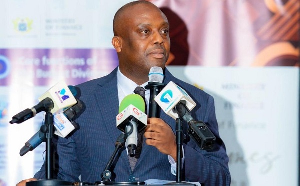Elmina (Central Region) -- Dr Sam Jonah, Chief Executive of the Ashanti Goldfields Company (AGC) has observed that there could be no viable private sector development without a strong, efficient and investor-friendly public sector.
The Civil Service need re-orientation, he said and urged the government to initiate an all-embracing education for the Civil Service to liase with the private sector. "Unless we address this problem, policy formulation and implementation will continue to be out of sync and the cost of doing business in Ghana, will continue to be very high," he added.
Dr Jonah was speaking on the topic "Strategies for Promoting Private Sector Investment in Ghana", at a three-day National Workshop to define the policy direction and strategies for achieving the "Golden Age of Business", at Elmina, in the Central Region at the weekend.
"20 years of mismanagement of the economy has sapped the confidence of the Civil Servants, they are badly paid, feel unappreciated, their morale is desperately low and investors complain that the attitude of Civil Servants is one of hostility to them", he said.
"Regulations; licensing and inspection are part of the weapons wielded by some civil servants to frustrate the private sector. Ports and immigration procedures are cumbersome and it takes about 20 days to take delivery of goods at the Ghana ports as against 15 days in Nigeria and 30 minutes in ports in UK and France," he added.
Dr Jonah said the government must lay foundation of a strong and productive private sector that would truly serve as the engine of the country's economic growth since it was committed to ensuring that its policies and principles were carried through.
The government's determination to make Ghana the gateway to the sub-region and the investment destination of choice, could only be successful when there was an environment that was safe, friendly and economically attractive, he stated. "Our economic destiny lies in an integrated sub-region and we must therefore work hard to turn protocols into reality," he added.
Dr Jonah called for revision of the country's Corporate Laws because they were "out of step with dynamic progress in the international corporate environment and did not facilitate and sustain investments".
He said Ghana had comparative advantage by investing in mineral resources, agriculture and agro-processing, tourism, Information Technology (IT) and education and urged the government to direct its efforts in sourcing investments.
Dr Jonah said there was greater return in exploiting South-South linkages than the previous North-South co-operation that had characterised the country's efforts to promote.
"Many of these emerging partners have closer cultural affinity to us and they have a greater appetite for risk than their colleagues in the North, in addition they are accumulating capital that is looking for a home," he added.
Dr Jonah said in the government's investment promotion efforts, the country's Ambassadors should know that economic diplomacy was now the order of the day and should be at the forefront to promote Ghana and attract investors.
The government also needed a proactive public relations unit to effectively market its policies to the public, he noted.
General News of Monday, 21 January 2002
Source: .












